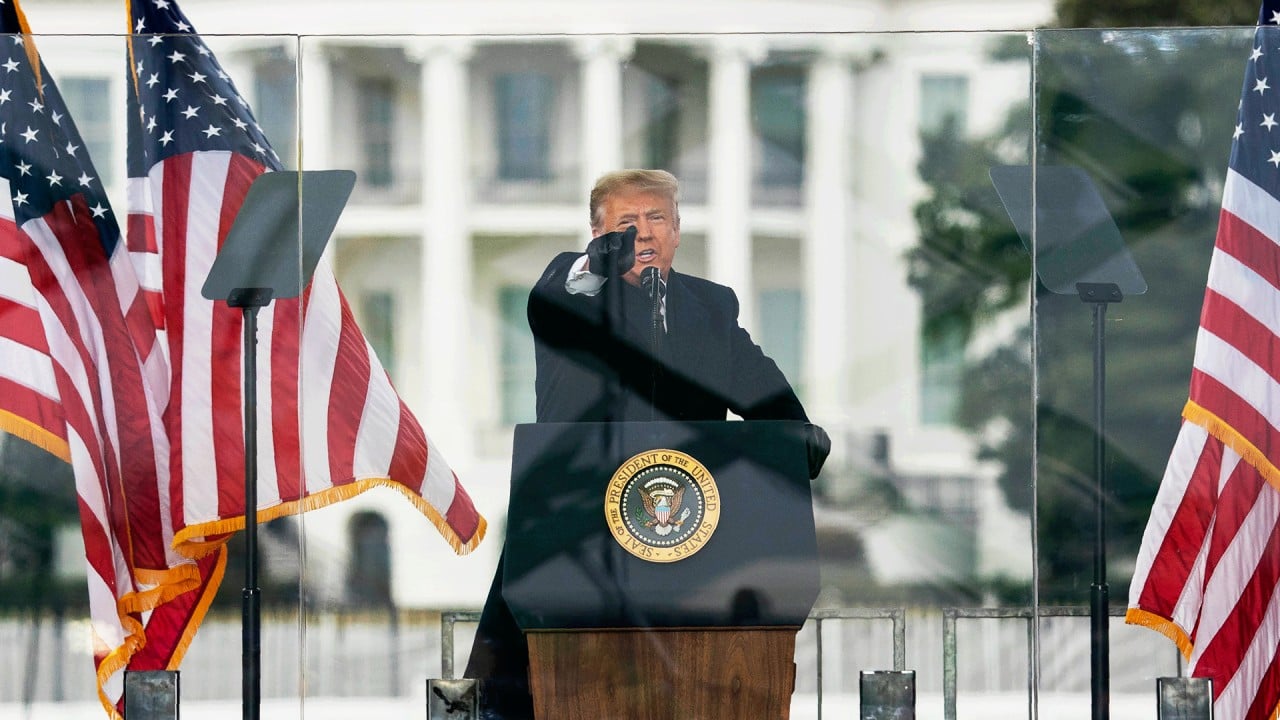
America bids farewell to Trump, but Trumpism lives on
- Support for the disgraced leader’s brand of politics cuts across a wide swathe of US society, tapping into people’s deep-seated frustrations. Joe Biden should expect an uphill battle getting his administration’s agenda passed in Congress
Notwithstanding the drama of a second impeachment, the ambivalence of many party heavyweights suggests that the GOP cannot afford to alienate a majority of Republican voters. According to a recent poll by Quinnipiac University, reported in The New York Times, 80 per cent of Republican voters say they do not hold Trump responsible for the rioting and 73 per cent think he is protecting democracy.
Trump’s popularity is no mere iconoclasm. By hook or by crook, he has managed to capture the zeitgeist of American politics – deep-seated frustrations and anger speaking to the heart and soul of the nation.

02:08
Trump pressures Pence to block Congress’ confirmation of Biden’s presidential win
A large swathe of less-educated, white working-class Americans, especially blue-collar workers, have become increasingly disgruntled. They feel that successive governments have left them behind with dwindling job opportunities and stagnant wages. Trump has successfully turned their anger on an “elitist” Democratic Party championing free trade, globalisation, Wall Street and digital behemoths.
Moreover, white evangelical Protestants made up 26 per cent of voters in 2012. They support Trump to counter what they regard as creeping social decay exemplified by the liberal-left’s irreligious laxity and freedom of abortion.
Why the biggest barrier to overcoming racism is ‘white fragility’
Neither is Trumpism restricted to the blue-collar population. His 2016 “America first” election campaign was endorsed by 136 “Scholars and Writers for America” connected with the alt-right intelligentsia.
According to Steven Pinker in Enlightenment Now, this support can be traced to one of the most influential, if controversial, modern philosophers – Friedrich Nietzsche, who thought that humankind’s full potential could only be realised by the heroic glory of a superman (Übermensch) exercising the “will to power”. Not unlike Trump, Nietzsche said that “there are no facts, only interpretations”.
Feeding into this is the sinking feeling that America is losing its global dominance, thanks to having “blindly” helped China to join the World Trade Organization and condoning its “unfair” trade practices.
This is wounding Americans’ long-cherished pride in US primacy, harking back to the nation’s historic self-image as a “shining city on a hill”. Hence, the popularity of Trump’s battle cry of “Make America Great Again” (MAGA) and his no-holds-barred pushback on China.
Apart from maintaining a stronghold in rural America’s heartlands, Trump is also backed by multibillionaire tycoons in the oil, gas, and coal industries. Some of this “old money” has long-established tentacles in American politics, including party contributions and financially-supported powerful think tanks to promote their political agenda. New Yorker writer Jane Mayer’s exposé in Dark Money is revealing.
Trump’s support base still retains control of half of the Senate, barring the Senate president’s tiebreaking vote. Through filibuster or other tactics, key reform measures of the incoming Biden presidency to win back blue-collar workers, such as by promoting unionisation, which is anathema to Republican big businesses, could well be delayed or even derailed.
Chaos at the US Capitol was a Trumpian farce, with shades of Mao
Meanwhile, he is said to be planning to invest more in building up America’s human capabilities and physical infrastructure so as to compete with China fair and square.
Trump’s MAGA mantra has inspired no lack of capricious and transactional policies and actions departing from reason, science and humanism – the values of the Age of Enlightenment which, according to Pinker, supported the historic rise of America as a great nation.
Biden’s massive relief package is likely to face strong Republican opposition, to be dismissed as over-the-top “tax and spend” policies favoured by Democrats. When the dust has finally settled on the “Trump insurrection”, Republicans are likely to regroup and consider how best to recapture Capitol Hill from Biden, by co-opting Trumpism without its more repugnant elements.
For Biden to truly bury Trumpism, he will need to change a lot of hearts and minds to unite a deeply-divided and broken country. For this, he may need more than one presidential term.
Andrew K.P. Leung is an independent China strategist. [email protected]

